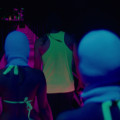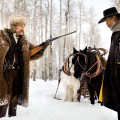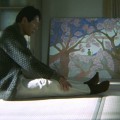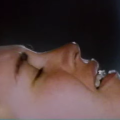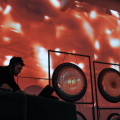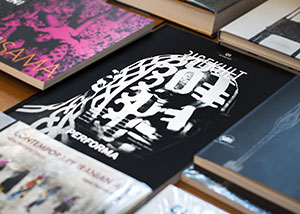La realtà è perduta. Lo spasmodico desiderio d’amore passionale impossibile, quale unica salvezza di un’utopica ricerca di ordine nella psiche. Freddie Quell siamo noi uomini raffigurati nella personale perdizione del nostro vizio: l’istintivo desiderio carnale, nell’abbandonarsi a se stessi, una sotto forma di castrazione dal reale alienante che nutre quel desiderio di abuso catalizzato da un tormento perenne. Il protagonista di The Master interpretato da uno straordinario Joaquin Phoenix è quello che più raffigura il principio umano. La scena iniziale è già simbolica nell’istintiva presa di coscienza del desiderio, una figura di sabbia raffigurante una donna nuda smuove in Freddie quell’istinto recondito di sesso, portandolo all’alterazione sensoriale veicolata da un abuso perenne, che non si limiterà al mero desiderio sessuale ma anche all’alcool, distruggendogli completamente il sistema nervoso. Finché un giorno, in modo del tutto casuale, Freddie verrà a contatto con Lancaster Dodd, famoso inventore di un sistema di introspezione che sperimenta su vari pazienti, Freddie ormai senza speranze, deciderà di sottoporsi ad uno di questi esperimenti traendone grande giovamento. Da quell’istante nasce un forte legame tra i due personaggi che li porterà ad intraprendere un vero e proprio viaggio spirituale, nel quale Freddie crederà fortemente nonostante il differente epilogo. Con The Master, Paul Thomas Anderson cerca di raccontare la psiche e i comportamenti umani, senza però alcuna intenzione di una ricerca allo scandalo ma col solo desiderio di comprenderne le ragioni, perché bisogna comunque credere in qualcosa, quando si è perso tutto? Potremmo dunque dire che i personaggi dei suoi film si esprimono con un solo termine possibile: la solitudine. I protagonisti di “Magnolia” o di “Il Petroliere”, erano accomunati da questo elemento (ne il “Petroliere” il protagonista finirà per impazzire per la solitudine). La psiche è sempre stata fondamentale per Anderson e in questo caso, l’abuso, rimane la forma metaforica che ci racconta questo sentimento. Soli, profondamente soli sono appunto Freddie e Lancaster. Il primo malato di sesso alla ricerca di inalveare la propria violenza in risse casuali. Il secondo, dotato di un potere di persuasione su uomini e donne bisognosi di credere in vite precedenti tramite trattamenti d’ipnosi. Molti seppur non espliciti sono i riferimenti a Scientology: Dodd sembra somigliare molto al suo fondatore Lafayette Ronald Hubbard. Mark Rathbun, che è stato in Scientology per ben 25 anni è oggi tra l’altro uno dei suoi più grandi detrattori, non dei suoi principi ma dell’ordine di quella chiesa. Scrisse infatti che Philip Seymour Hoffman ha saputo imprigionare molto fedelmente la personalità di Hubbard, già per la simbolica frase di presentazione enunciata da Dodd a Freddie «Io sono uno scrittore, un medico, un fisico nucleare e un filosofo teoretico, ma soprattutto un uomo, proprio come te». Di primo acchito il riferimento alla fisica nucleare non è molto chiaro, ma nella biografia di Hubbard, si dice che in passato seguì il primo corso americano sui fenomeni atomici e molecolari. Hubbard stesso in molti scritti, amava infatti definirsi un “fisico nucleare”, pubblicando in seguito anche un libro a riguardo, in cui sosteneva che gli effetti della radiazioni si potevano curare con le vitamine. Lo stesso Dodd propone teorie che hanno dell’assurdo, come curare un cancro con l’ipnosi. Tutto il film s’incentra su questa fedele proclamazione d’amore verso il credo di Dodd, fortemente sostenuto da Freddie, che nella sua solitudine, deve trovare una speranza per proseguire la sua vita ormai in declino. I due avranno spesso alterchi, ciò nonostante Freddie tornerà sempre dal suo “maestro”, che addirittura gli farà credere di averlo già incontrato in un’altra vita, in un cammino di redenzione e trasformazione da “animale” a uomo, nella sua purezza originale. I principi di Lancaster Dodd sono quelli di una forte e radicata centralità sull’uomo, sull’autocontrollo, dove il vuoto non può esistere, quel vuoto generato da una carenza affettiva, da una figura “materna”, metaforizzata poi da quell’abbraccio alla statua di sabbia ad inizio film. Paul Thomas Anderson ci presenta probabilmente la sua più intima e complessa opera, con un imponente formato 70mm e la prestigiosa colonna sonora composta da Jonny Greenwood (chitarrista dei Radiohead) già precedentemente compositore del soundtrack de “Il Petroliere” ed a seguire”Inherent Vice”. Un film che riesce nell’intento di raccontare una storia sulla psiche umana, sull’esistenza travagliata. Vengono messi a confronto due personaggi di contrastanti realtà che ciò nonostante finiranno per comprendersi nelle loro contraddizioni, con un finale amaro, che sembra dividerli definitivamente. Dodd saluta il suo fedele discepolo dedicandogli la canzone “On A Slow Boat To China”, canzone popolare cantata tra gli altri anche da Frank Sinatra e Ella Fitzgerald. Un addio amaro che però li riavvicinerà nella vita quotidiana, l’ultima scena vedrà infatti Freddie durante un rapporto sessuale pronunciare proprio quelle stesse domande che il suo “maestro” Dodd imponeva durante i suoi trattamenti ipnotici, sancendo quindi un legame mentale indissolubile.
The reality is lost. The spasmodic desire for a passionate impossible love, as the only salvation of a utopian search for order in the psyche. Freddie Quell is every men as we are depicted in the personal destruction of our vice: the instinctive lust, committing oneself to oneself, a kind of castration from the real alienation that feeds the desire to abuse catalyzed by a perpetual torment. The protagonist of “The Master” starring Joaquin Phoenix is an extraordinary one that depicts the human principle. The opening scene is already symbolic of the instinct in taking conscience of desire, a figure made of sand depicting a naked woman stirs in Freddie the hidden instinct of sex, leading to the alteration sense conveyed by a perpetual abuse, which will not be limited to the mere sexual desire but also to alcohol, completely destroying his nervous system. Until one day, occasionally, Freddie will be in contact with Lancaster Dodd, famous inventor of a system of introspection that experiments on various patients, Freddie now hopeless, decides to undergo one of these experiments with large benefit. From that was born a strong bond between the two characters that will lead them to undertake a genuine spiritual journey, in which Freddie believes strongly despite the singular denouement. With “The Master”, Paul Thomas Anderson tries to tell the psyche and human behavior, but without any intention to provocation but with the sole desire to understand the reasons, because you still believe in something, when you lost everything? We may therefore say that the characters in his films are expressed by a single term : loneliness. The protagonists of “Magnolia” or “There Will Be Blood,” were united by this element (in the “Tankers” the protagonist will end up going crazy from loneliness). The psyche has always been central to Anderson and in this case, the abuse, remains the metaphorical form that tells us this feeling. Alone, deeply alone they are precisely Freddie and Lancaster. The first sick of sex transforming violence into random fights. The second, with a persuasive power over men and women needs to believe in past lives through hypnosis treatments. Many, even not explicit, references to Scientology: Dodd seems to look much like its founder Lafayette Ronald Hubbard. Mark Rathbun, who was in Scientology for 25 years now by the way one of the biggest detractors, not about its principles but the enforcement of that church. He wrote that Philip Seymour Hoffman has been able to very accurately imprison Hubbard’s personality, already for the symbolic presentation sentence enunciated by Dodd Freddie, “I am a writer, a doctor, a nuclear physicist and a theoretical philosopher, but above all a man, just like you”. At first glance the reference to nuclear physics is not very clear, but in the biography of Hubbard, it is said that in the past he followed the first American course on atomic and molecular phenomena. Hubbard himself in many writings, in fact, he loved to call himself a “nuclear physicist” later also publishing a book about it, in which he claimed that the effects of radiation could be cured by vitamins. The same Dodd proposes absurd theories , how to cure cancer with hypnosis. The whole film is centered on this faithful proclamation of love to the credo of Dodd, strongly supported by Freddie, who in his loneliness, he must find a hope to continue his life now in decline. The two will often have quarrels, nevertheless Freddie will always return to his “master”, who will make him believe as already met in another life, in a journey of redemption and transformation from “animal” to man, the pure and original one . The principles of Lancaster Dodd are those of a long-standing human centrality, on self-control, in which a vacuum can not exist, that void created by a lack of affection, by a figure “maternal”, a metaphor that embraces the statue of sand at the start of the film. Paul Thomas Anderson probably presents his most intimate and complex work, with an impressive 70mm format and the prestigious soundtrack composed by Jonny Greenwood (Radiohead guitarist) previously composer of the track of “There will be blood” and “Inherent Vice”. A film that succeeds in telling a story about the human psyche, on a troubled existence. It compares two characters of opposite realities that nevertheless will eventually understand each other in their contradictions, with a bitter end, which seems to divide them permanently. Dodd hails his faithful disciple dedicating the song “On A Slow Boat To China”, folk songs sung among others by Frank Sinatra and Ella Fitzgerald. A bitter farewell but that will close them again in everyday life, the last scene in fact sees Freddie during intercourse pronounce those very same questions that his “master” Dodd demanded during his hypnotic treatments, then sanctioning an unbreakable mental link.






















